In 2024, open-source eCommerce platforms are emerging as the go-to choice for B2B businesses looking to thrive in the digital marketplace. These platforms offer numerous benefits, including cost-efficiency, adaptability, and an active developer community.
However, with a plethora of options available, how do you choose the right open-source eCommerce platform for your B2B venture? Fear not; in this comprehensive guide, we’ll walk you through the top 7 B2B open-source eCommerce platforms of 2024. Whether you’re starting a new venture or considering a platform switch, our insights will help you make an informed decision that aligns with your business goals.
Top 7 Best Open Source Ecommerce Platforms 2024
Table of Contents
1. Magento

IN CASE you’re interested, about take a glance at our B2B website development service?
Magento 2 Open-source Edition (also known as Community Edition) is one of the most popular B2B open-source eCommerce platforms, with over 300,000 users from all over the world.
This B2B eCommerce open source allows you to scale up your website side-by-side with your business’s development, from a small vendor with a limited product line to a corporation that features thousands of products at once.
Moreover, Magento 2 is optimized for maximum integrated capability, which means you can easily extend its functions via third-party system software like ERP, PIM, or CRM. As a result, you can quickly fill in any missing features just how you want them to.
Even without many exclusive wholesale features from Enterprise Edition, thanks to the quick setup and the freedom of customization, the Open-source Edition of Magento 2 is still an excellent choice for many small and mid-size businesses.
Magento offers:
- Dependable cloud hosting (for cloud edition).
- Extensive B2B functionality.
- Freedom in pricing customization.
- Optimized wholesale features.
- Easy backend integration.
- Multi-sales-channel function.
- Detailed report & analytics.
- Great product information management.
- Effective order tracking.
Sample websites: LandRover, Helly Hansen.
If you are looking for B2B extensions for your Magento store, the B2B Magento 2 Extension Package is your ultimate solution! Packed with essential features like tailored pricing, bulk order support, and advanced company account management, it’s designed to streamline operations and elevate the B2B shopping experience.
2. OroCommerce
OroCommerce is a flexible, enterprise-grade, open source eCommerce platform solution built by the same team who founded and grew Magento.
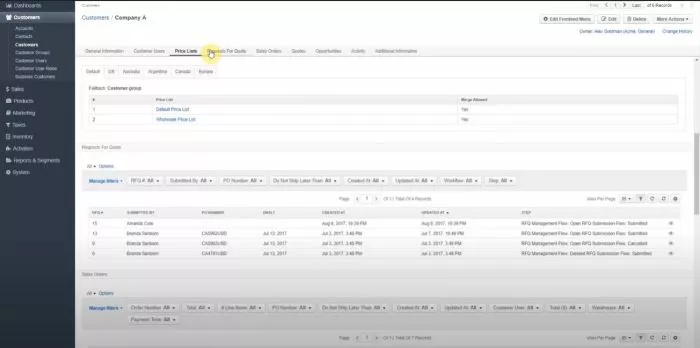
It is used by manufacturers, distributors, wholesalers, and retailers in B2B, B2C, B2B2C, multi-channel, and marketplace selling scenarios. Businesses choose OroCommerce because of its long list of B2B features that are out of the box and the ability to customize and extend the solution to suit diverse business needs.
OroCommerce features an open-source architecture, APIs that support integrations of various complexities, and a marketplace of integrations and plugins. It also boasts a large ecosystem of solution and technology partners able to deliver projects of any scale and complexity.
Lastly, OroCommerce will deploy according to your requirements, whether on-premise, in-private or public cloud, or hybrid environments.
OroCommerce also comes with:
- Support for complex corporate structures.
- Business customer account management.
- Omnichannel, multi-channel, multi-vendor capabilities.
- Multi-organization, multi-currency, localization options.
- Pricing, tax, RFQ (quoting), and order approval.
- Workflow engine to digitize manual processes.
- Strong reporting and analytics functionality.
- Comes with a CRM integrated with eCommerce.
- 24/7 customer service for enterprise customers.
Sample websites: TruPar, Saltworks.
3. WooCommerce
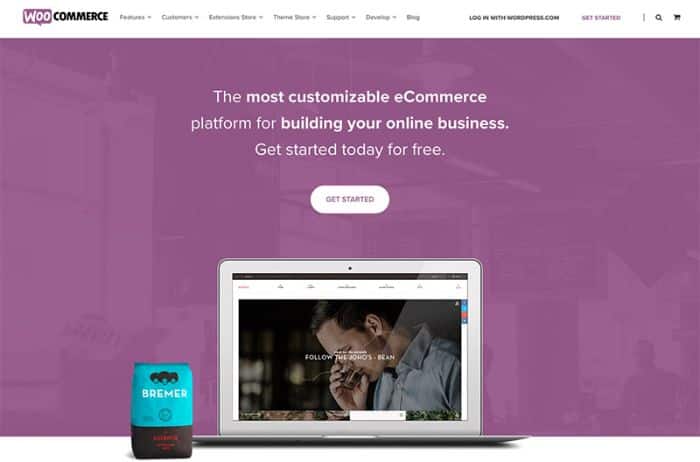
WooCommerce is an amazing WordPress plugin that makes it a popular platform for B2B businesses.
Control over 38% of online retailers, WordPress WooCommerce, has been downloaded over 15,000,000 times. This eCommerce plugin was developed with the intent of helping users transform their existing WordPress website into a fully functional eCommerce store for both B2B & B2C purposes.
Many businesses choose WooCommerce to build their B2B eCommerce website because of its simplicity and functionality. With WooCommerce, you’re allowed to sell everything from digital goods to physical ones or services.
That said, WooCommerce even provides many further developed & advanced features, which of course come with a decent price tag in case you want to scale up your business website as it’s on the way to becoming more extensive.
WooCommerce has a lot of quality features:
- Several checkout options.
- Active community with forums. Huge help community
- Various extensive plugins.
- Flexible open-source customization.
- Optimized for wholesale.
- Best SEO optimization.
- High-security services.
- Friendly features for newcomers.
- Lots of integration opportunities.
Sample websites: Jhornig, Porter & York.
>>> Read more: Top 7 Best Free Website Builder For ECommerce In 2024
4. PrestaShop
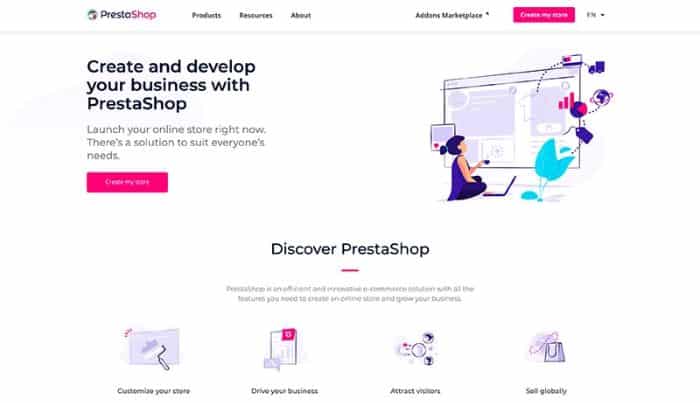
PrestaShop is boasted to be used by around 300,000 wholesale and retail businesses, which is pretty impressive considering its age. It’s also translated into 65 languages in over 200 countries.
Since it offers up to 600 features, not to include thousands of third-party extensions, this B2B open source eCommerce platform has potentially enough to be one of the best solutions to build your B2B store.
PrestaShop features many functionalities, such as:
- Various themes are supported.
- Custom checkout solutions.
- Effective inventory & stock management.
- Tracking customer relationships.
- Automatic analytics and reports.
- Flexible VAT & Tax calculation.
- Multi-currency support.
- Optimized marketing modules.
- Global distribution support.
- Various currency options are available.
Sample websites: Monsieur Chaussure, Kliknklik.
5. OpenCart
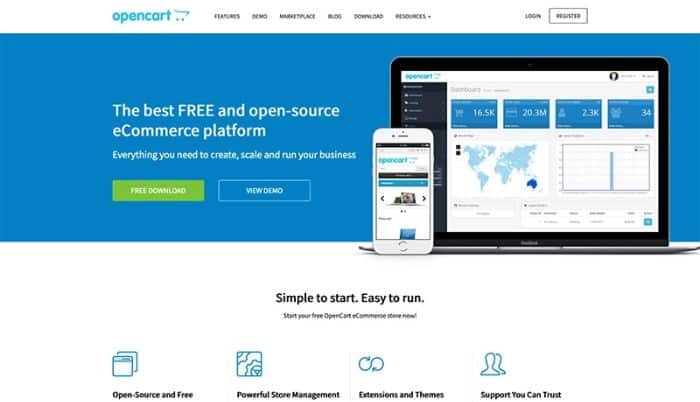
OpenCart is one of the best wholesale e-commerce platforms that achieved incredible feats with about 580,000 eCommerce users and around 1,000 OpenCart websites present in the top 1 million Alexa-trusted domains.
One of the selling points for OpenCart to be chosen is the vibrant and friendly user interface, which is easy to operate even for newcomers. The platform is also multicurrency and multilingual with over 20 payment methods.
The OpenCart culture is friendly and vibrant. Although the website was established in Hong Kong, its users are based in the United States. OpenCart is multicurrency and multilingual, with over 20 payment gateways and eight delivery options.
Many OpenCart customers appreciate the turnkey aspect of this open-source eCommerce platform, eliminating the need for other wholesale commerce.
OpenCart offers a bunch of impressive features such as:
- Fast support without charge.
- Lots of plugins & themes.
- Efficient stock management.
- SEO optimization for the open-source platform. (Choosing The Best ECommerce Platform For SEO)
- Email marketing support.
- Wholesaler marketplace browsing.
- Easy sub-domains development.
- Transaction tracking at ease.
- Order management for wholesale business.
Sample websites: Shorelines, Missyempire.
6. X-Cart
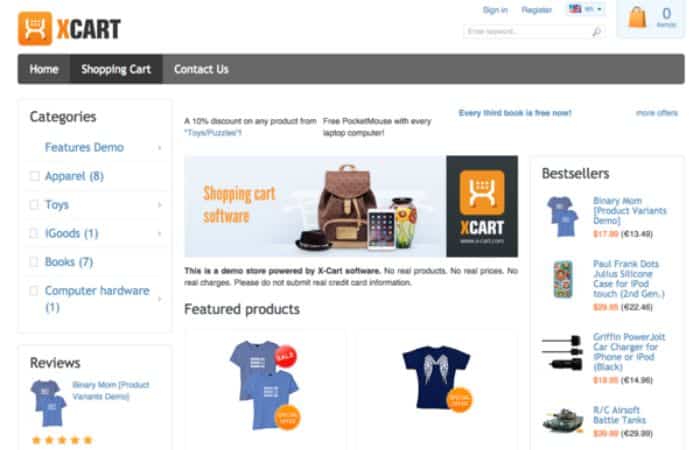
X-Cart is a reliable open-source PHP solution that provides lifetime licenses to customers. This is great if you don’t want to waste your money on annual licensing fees like other platforms on the list. Yet, it’s required for your website to self-install with hosting services of your choice.
To enhance the selling process, X-Cart also provides an upgrade with the high price of $495 and up, which will give your store a bunch of advanced features for better B2B conversion. It’s a good decision for a successful store, and given the license is for a lifetime, it’s not a bad bargain.
X-Cart is optimized for manual coding and the extensive use of HTML, so it’s best for businesses that already have an in-house team of developers.
Sample websites: Readers, RacingJunk.
7. Drupal Commerce
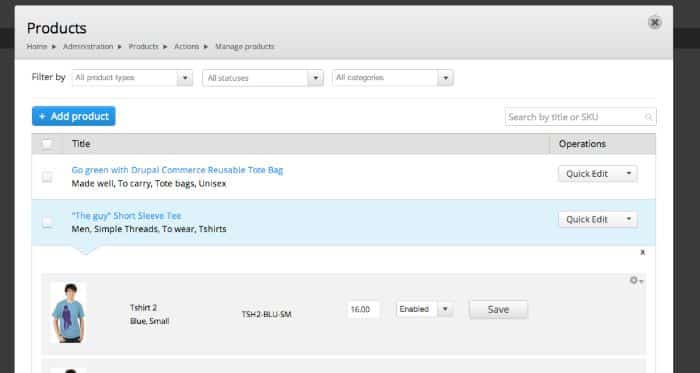
Drupal Commerce, one of the top b2b e-commerce platforms systems available, was created by the Commerce Guys team. Drupal Commerce features multilingual development with multi currency support and many B2B basic features that work perfectly fine on a global scale.
This B2B ecommerce open-source platform is optimized for integration with a wide range of third-party applications. Since Drupal Commerce is based on Drupal Content Management System, a CMS, it’s potential for any store that is already planning a content marketing strategy.
Since it’s an open-source platform, the support service is usually expensive and not fit for small wholesale businesses without a team of web developers.
Sample websites: Chupa Chups, Mintz.
8. Ubercart
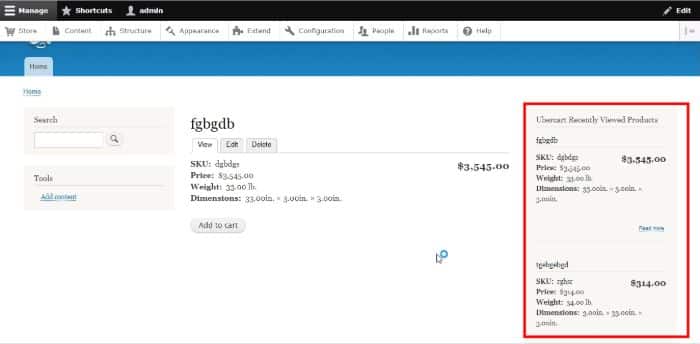
Ubercart has been available as an open-source ecommerce approach for quite a while, yet it’s falling apart in recent years and only appears to be at the bottom of the chart.
This ecommerce platform has its pros and cons. Since it’s built to work with Drupal Commerce, the shipment tracking and order monitoring are great, yet it’s only optimized for the small wholesale store with no scaling options.
Sample websites: Supermarketnews, JRTstudio.
This is the top 7 best B2B open source ecommerce platforms you can use to build your store. We hope this article bring useful information to you. BSS Commerce is one of the leading Magento 2 extension and Magento development services providers globally. With experienced and certified developers, we commit to bringing high-quality products and services to optimize your business effectively.

